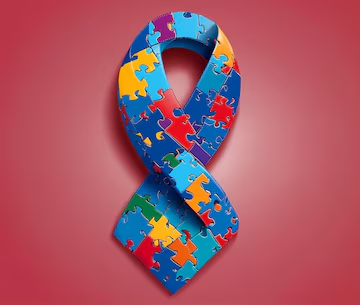
Estimated reading time: 5 minutes
Efe Irele, Nigerian actress sometimes last week put up the “Of course, I am…’ challenge with her autistic brother also creating awareness for autism. All through April is Autism Awareness Month. It is used to sensitize people about the brain and behavioral conditions.
Many people are stereotypical about the way they see autistic people. They paint a picture of how they should behave or look. Some people think autistic people are not meant to be smart or vibrant. Others think they need to be dependent on others before they can do anything. Well, this school of thought might be correct for a set of autistic persons but not for others.
If you are a fan of ‘Heartbreak High’, you would notice Sasha’s reaction when Quinni told her that she was autistic. Sasha had a stereotypical idea of what an autistic person should look like and she considers Quinni ‘too smart’ to be autistic. This month is meant to sensitize the public about brain and behavioral conditions.

A more encompassing term for Autism is Autism spectrum disorder
The World Health Organisation terms the autism condition as Autism spectrum disorder. The disorder appears in many forms. One may not even know if they are autistic. This spectrum disorder affects 1 in 100 children. Let’s see the definition of spectrum disorder according to the World Health Organization.
‘Autism spectrum disorders (ASD) are a diverse group of conditions. They are characterized by some degree of difficulty with social interaction and communication. Other characteristics are atypical patterns of activities and behaviors, such as difficulty transitioning from one activity to another, a focus on details, and unusual reactions to sensations.’
People with this disorder can most times be unresponsive to social interaction. They might find speaking difficult because they have not focused on the communication process. Autism is usually not diagnosed in childhood until when the age of expressing communication kicks in. But usually, they cannot mostly engage in focused social interaction.


The Centers for Disease Control and Prevention (CDC) are more inclusive with their definition, ‘Autism spectrum disorder (ASD) is a developmental disability caused by differences in the brain.’. In Kayla Taylor’s book, Canaries Among Us, she consistently states the fact that some children have psychological differences and not disorders. She also made mention of the term ‘neurodiversity’.
CDC definition is more inclusive and is my go-to definition for ASD. This condition is caused by how differently the brain is wired in some set of people. On the CDC website, it was further stated that ‘people with ASD may also have different ways of learning, moving, or paying attention.’
How do you know if someone has an Autism spectrum disorder?

Unresponsiveness is the main symptom of the Autism spectrum disorder. There is complete or partial unresponsiveness of such a person to social and interaction skills. CDC highlights some of the symptoms below.
- Avoids or does not keep eye contact
- Does not respond to name by 9 months of age
- Does not show facial expressions like happy, sad, angry, and surprised by 9 months of age
- Does not play simple interactive games like pat-a-cake by 12 months of age
- Uses few or no gestures by 12 months of age (for example, does not wave goodbye)
- Does not share interests with others by 15 months of age (for example, shows you an object that they like)
- Does not point to show you something interesting by 18 months of age
- Does not notice when others are hurt o
- Delayed language skills
- Delayed movement skills
- Delayed cognitive or learning skills
- Hyperactive, impulsive, and/or inattentive behavior
- Epilepsy or seizure disorder
- Unusual eating and sleeping habits
- Gastrointestinal issues (for example, constipation)
- Unusual mood or emotional reactions
- Anxiety, stress, or excessive worry
- Lack of fear or more fear than expected
- They are upset by 24 months of age
- Does not notice other children and join them in play by 36 months of age
- Repeats words or phrases over and over (called echolalia)
- Plays with toys the same way every time
- Is focused on parts of objects (for example, wheels)
- Gets upset by minor changes
- Has obsessive interests
- Must follow certain routines
- Flaps hands, rocks body, or spins self in circles
These are the visible symptoms but mind you, it happens that some people who is diagnosed with this condition might not even exhibit some of these symptoms. It is important that you visit a psychologist to test for these symptoms and proper disgnosis.
Autism Awareness Month
The Autism Awareness month was picked by Bernard Rimland Ph.D in April, 1970. He was a psychologist and autism researcher. The Autism Awareness Month also doubles as the Autism Acceptance Month. It is clear that people living with this condition are ostracized by others. The symptoms of autism are difficult to live with so we should not make life more difficult for them.
The toolkit
Discover more from News Round The Clock
Subscribe to get the latest posts to your email.










